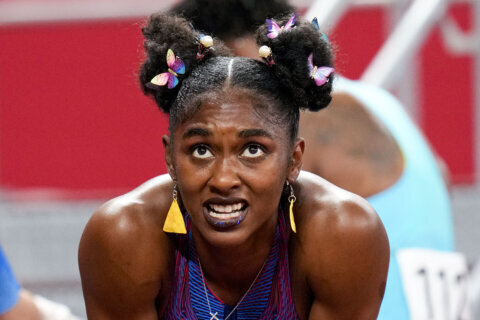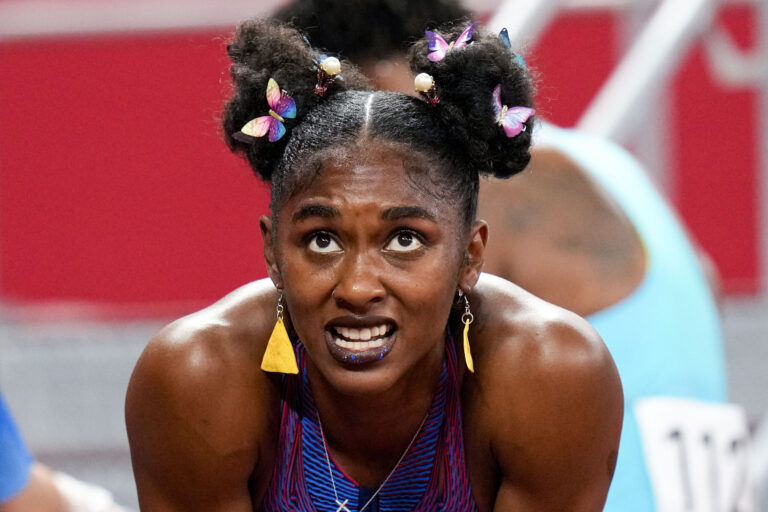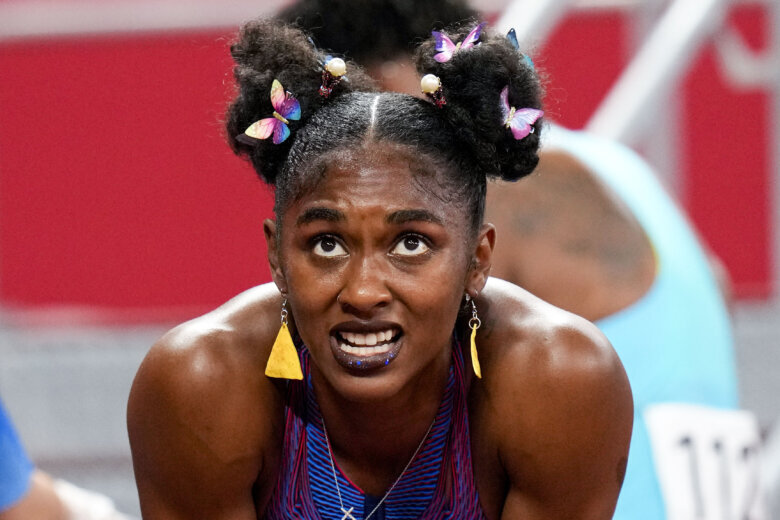The support being offered to athletes who are also parents at the Paris Olympics is just part of a larger trend in which the rise of women’s sport is putting more emphasis on the needs of motherhood and parenthood.

The support being offered to athletes who are also parents at the Paris Olympics is just part of a larger trend in which the rise of women’s sport is putting more emphasis on the needs of motherhood and parenthood.
In France, for the first time, the Olympic Village will have a nursery for the athletes’ children, and organisers will provide separate rooms for breastfeeding mothers. But it’s not just the Olympics.
Soccer’s international governing body, FIFA, recently added a new policy that expands on landmark rules adopted in 2020 that gave players at least 14 weeks of paid maternity leave. The new rules also expanded benefits to coaches and provided paid leave to adoptive and non-biological parents.
Similarly, USA Track and Field announced a program in April to provide more financial support and insurance to athletes as they return from pregnancy.
For athletes in other sports, the United States Olympic Committee has introduced the U.S. New Families Fund, which distributes grants to help parents with child care, baby supplies and nutritional support.
U.S. national soccer team defender Casey Kruger welcomes the sports world’s greater attention to both pregnancy and the needs of athletes who are parents to young children.
For Kruger, it’s personal: She has somewhere to breastfeed her son while he starts competing in France this week.
“I actually just had a discussion with the coaching staff and the U.S. Soccer Federation. They were in contact with FIFA and trying to work out some logistical issues,” Kruger said. “I’m still breastfeeding my son, so he’s coming to the stadium with us. They’ve been so accommodating, giving him a room and allowing me to (breastfeed) before the game. So I’ve felt an incredible amount of support.”
Overall, however, efforts to address parent needs, both in domestic leagues and at major international events such as the Olympics, are fragmented and vary across sports and participating countries.
FIFA is in a unique position to set standards for players compared to other sports because it governs the largest women-only international sporting event, the Women’s World Cup, and sets the standard for competition internationally.
Last year’s Women’s World Cup in Australia and New Zealand was an opportunity for FIFA to introduce new policies for tournaments that require players to be away from home for weeks at a time, including providing nanny allowances for traveling squads and providing car seats on official transport.
FIFA’s new guidelines also require teams to give time off for any problems that may arise during menstruation, and changes have been made to player transfer rules to give teams more flexibility in signing players if they are pregnant or rested.
“If we want to include women in football, we have to include women in all aspects of football. … We need to make sure that women are protected from a labour perspective, that they can make a living from football, that they are not disadvantaged when they want to have a family, whether that be a biological family, whether they want to adopt, whether they are biological mothers,” said Sarai Bareman, FIFA’s head of women’s football. “And if we want more and more women on the planet to play football and make a living from football, then these measures are absolutely necessary to ensure that.”
But for most athletes, navigating childbirth and parenthood can be a confusing and daunting proposition, and it often depends on the laws in place in each country: Many Olympic athletes aren’t covered by traditional labor contracts.
Track and field athletes have traditionally relied on corporate sponsorship, and former Olympic sprinter Allyson Felix, who won 11 medals, criticized Nike for its treatment of her during her pregnancy in 2019. She eventually parted ways with the company but pushed for policy change.
Hurdler Christina Clemons, a mother who recently competed at the Olympic Trials, said she felt supported by USATF, the USATF Foundation and corporate sponsor Doritos, but her experiences haven’t always been good.
“I was with Adidas for 12 years, I had a baby and they didn’t re-sign me. But I’m one of the best hurdlers in the world. So what does that mean? What is the argument? All we can focus on is that I had a baby,” she said.
Maternity leave and child care have long been part of the women’s collective bargaining agreement with the U.S. Soccer Federation, and the landmark equal pay deal the players reached with the federation in 2022 included a provision allowing fathers to provide child care during games and training camps.
Other countries, including Australia, have similar provisions in their labour agreements.
The National Women’s Soccer League (NWSA) and the WNBA have also recognized the needs of parents in their collective bargaining agreements, with the WNBA’s 2020 collective bargaining agreement including fully paid maternity leave and child care benefits.
Reforms are often driven by the players themselves, as was the case with Felix: Serena Williams’ return from pregnancy prompted the WTA to adopt new ranking rules that would not penalize female players for missing tournaments while giving birth.
The English Rugby Football Union offers players 26 months paid maternity leave.
But in many parts of the world, such policies have yet to be adopted, which is why initiatives like FIFA’s are so important.
“The message may not have a big impact in the United States because players are well protected, and the same goes for France and Spain, for example. We’re not reinventing the wheel in some countries, the message is already there in some form,” FIFA’s chief legal officer, Emilio Garcia, said. “But we have jurisdiction over 211 territories, so these measures may have a big impact in certain countries.”
___
AP Sports Writer Pat Graham contributed to this report.
___
AP Summer Olympics: https://apnews.com/hub/2024-paris-olympic-games
___
AP Soccer: https://apnews.com/hub/soccer
Copyright © 2024 The Associated Press. All rights reserved. This material may not be published, broadcast, written or redistributed.


